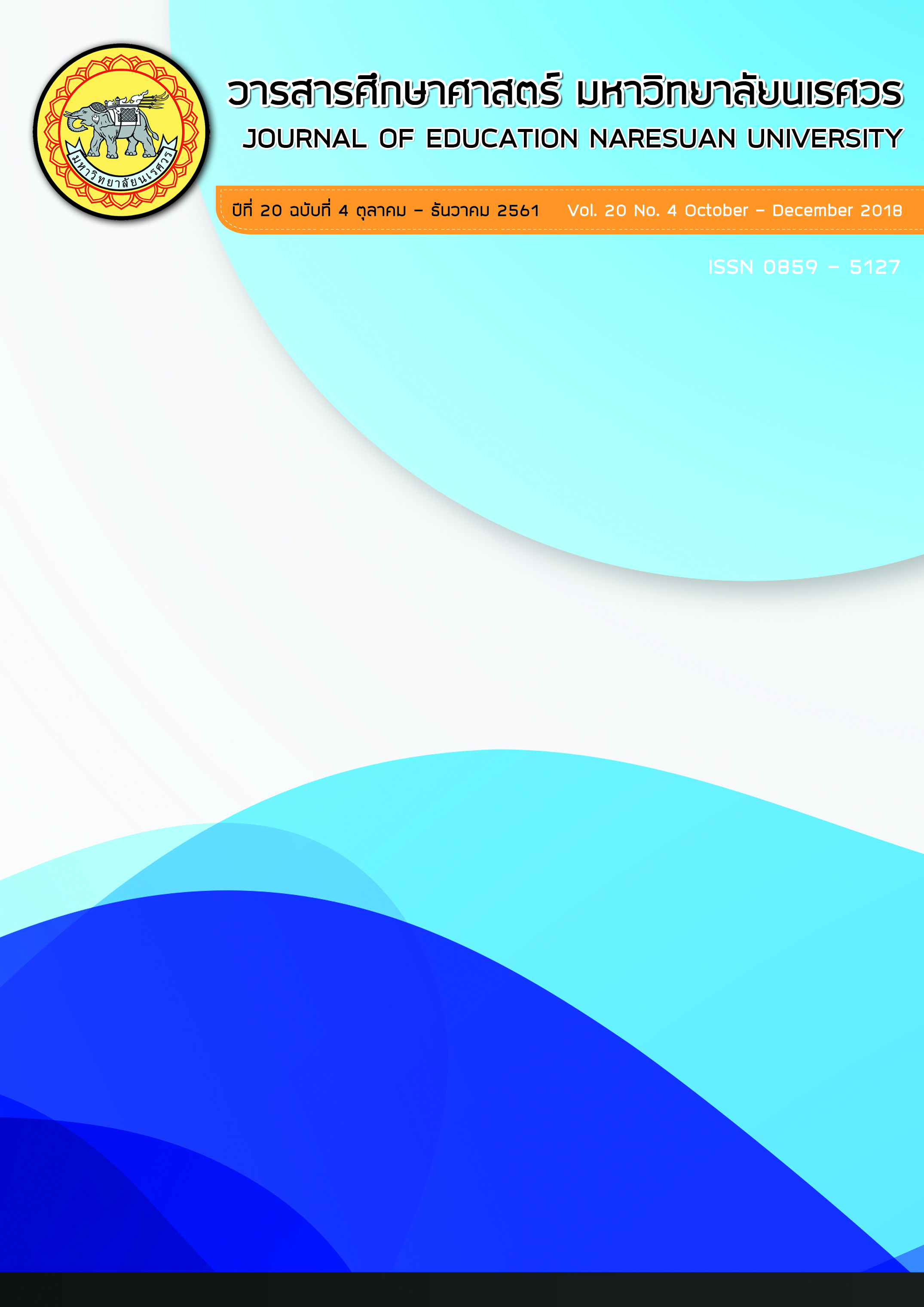การพัฒนาหลักสูตรฝึกอบรมเพื่อเสริมสร้างความสามารถในการสื่อสารภาษาอังกฤษ โดยใช้กลวิธีพหุประสาทสัมผัส สำหรับพนักงานโรงแรม; DEVELOPMENT OF A TRAINING CURRICULUM TO ENHANCE COMMUNICATIVE ENGLISH USING MULTISENSORY FOR HOTEL EMPLOYEES
Main Article Content
Abstract
การวิจัยครั้งนี้มีจุดมุ่งหมาย เพื่อพัฒนาหลักสูตรฝึกอบรมเพื่อเสริมสร้างความสามารถในการสื่อสารภาษาอังกฤษ โดยใช้กลวิธีพหุประสาทสัมผัส สำหรับพนักงานโรงแรม โดยดำเนินการตามกระบวนการวิจัยและพัฒนา (Research and Development) 4 ขั้นตอน คือ ขั้นตอนที่ 1 การศึกษาข้อมูลที่จำเป็นในการพัฒนาหลักสูตรฝึกอบรม โดยการสัมภาษณ์ พนักงานแผนกต้อนรับ โรงแรม 42C The Chic ผู้จัดการโรงแรม 42C The Chic และผู้จัดการโรงแรมแกรนด์ ฮิลล์ รีสอร์ท แอนด์สปา อาจารย์สาขาการท่องเที่ยวและการโรงแรม และครูผู้เชี่ยวชาญด้านกลวิธีพหุประสาทสัมผัส โดยใช้แบบสัมภาษณ์ข้อมูลที่จำเป็น ขั้นตอนที่ 2 การสร้างหลักสูตรฝึกอบรม เครื่องมือที่ใช้ คือ หลักสูตรฝึกอบรมเพื่อเสริมสร้างความสามารถในการสื่อสารภาษาอังกฤษ เอกสารประกอบหลักสูตรฝึกอบรม และแบบประเมินหลักสูตรและเอกสารประกอบหลักสูตร โดยผู้เชี่ยวชาญ จำนวน 3 คน ตรวจสอบความเหมาะสมของหลักสูตรฝึกอบรม ขั้นตอนที่ 3 การทดลองใช้หลักสูตรฝึกอบรม แหล่งข้อมูล คือ พนักงานแผนกต้อนรับโรงแรม 42C The Chic จำนวน 6 คน โดยศึกษาความสามารถในการสื่อสารภาษาอังกฤษระหว่างการฝึกอบรม โดยใช้ แบบประเมินความสามารถในการสื่อสารภาษาอังกฤษระหว่างการฝึกอบรมแบบบันทึกเหตุการณ์การฝึกอบรม และเปรียบเทียบความสามารถในการสื่อสารภาษาอังกฤษหลังการฝึกอบรม โดยใช้แบบประเมินความสามารถในการสื่อสารภาษาอังกฤษก่อนและหลังการฝึกอบรม ขั้นตอนที่ 4 การศึกษาความพึงพอใจที่มีต่อการฝึกอบรม โดยใช้แบบสอบถามความพึงพอใจ ดำเนินการใช้แบบแผนการทดลอง One Group Pretest-Posttest Design สถิติที่ใช้ในการวิเคราะห์ข้อมูล คือ ค่าเฉลี่ย ค่าเบี่ยงเบนมาตรฐาน ผลการวิจัย พบว่า
1. ผลการสัมภาษณ์ พบว่า มีความต้องการให้จัดการฝึกอบรมตามหลักสูตรฝึกอบรมเพื่อเสริมสร้างความสามารถในการสื่อสารภาษาอังกฤษ
2. หลักสูตรฝึกอบรมมีคุณภาพอยู่ในระดับมากที่สุด และเอกสารประกอบหลักสูตรฝึกอบรม ซึ่งประกอบด้วย คู่มือสำหรับผู้ให้การฝึกอบรม และคู่มือสำหรับผู้เข้ารับการฝึกอบรม มีคุณภาพอยู่ในระดับมาก
3. ผลการทดลองใช้หลักสูตรฝึกอบรม
3.1 ความสามารถในการสื่อสารภาษาอังกฤษระหว่างการฝึกอบรม พบว่า พัฒนาการของผู้เข้ารับการฝึกอบรม ทุกคนมีคะแนนพัฒนาการเพิ่มขึ้นทุกคน
3.2 ความสามารถในการสื่อสารภาษาอังกฤษหลังการฝึกอบรมสูงกว่าก่อนการฝึกอบรม อย่างมีนัยสำคัญทางสถิติที่ระดับ .05
4. ความพึงพอใจที่มีต่อการฝึกอบรมหลังเสร็จสิ้นกิจกรรมอยู่ในระดับมากที่สุด
DEVELOPMENT OF A TRAINING CURRICULUM TO ENHANCE COMMUNICATIVE ENGLISH USING MULTISENSORY FOR HOTEL EMPLOYEES
The purposes of this research were to develop of a training curriculum to enhance communicative English by using Multisensory for hotel employees. This research was divided into 4 steps in Research and Development as follows; Step 1: needs assessment for the development the training curriculum by interviewing four groups including receptionist at 42C Chic Hotel 6 persons. General Hotel manager in Nakhon Sawan including Grand Hill Resort and Spa Hotel and 42C Chic Hotel 2 persons. Lecturer of tourism and hotel 1 person. Teacher with expertise in Multisensory 1 person by using the need assessment interview, Step 2 construct the training curriculum. Research instruments consisted of training curriculum to enhance communicative English by using Multisensory for hotel employees, the curriculum supplementary documents and the evaluation form for appropriation of the training curriculum. Three experts examined the order to consider the appropriateness of the curriculum. Step to the training curriculum. The sample were employees of 6 persons at 42C The Chic hotel. In study ability the communicate English in between training by using ability evaluation between training, the training record. And compare ability communicate English in between before and after training by using ability evaluation before and after training. Step 4 Study employee’s satisfaction towards the training curriculum by using the questionnaire satisfaction. The research design was One Group Pretest –Posttest Design. The data analysis using mean, standard deviation. The results of this the study were
1. The result of interview people in 4 groups want to get the training curriculum to enhance communicative English by using Multisensory for hotel employees.
2. The training curriculum in overall was at very good level. The Curriculum supplementary documents included the manual for trainers, the manual for trainee overall was at good level.
3. The result of experiment the outcome by using the training curriculum
3.1 Ability to communicate English in between training the trainees all have scores all increased.
3.2 Ability to communicate English in between before and after training is higher than those of criterion at the.05 level of significance.
4. The employee’s satisfaction towards the training curriculum in overall was at the high level.
Article Details
The owner of the article does not copy or violate any of its copyright. If any copyright infringement occurs or prosecution, in any case, the Editorial Board is not involved in all the rights to the owner of the article to be performed.
References
Arwakul, W. (2007). Training. Bangkok: Chulalongkorn University Bookshop. (in Thai)
Bangmo, S. (2002). Technical training and conferences (2nd ed.). Bangkok: Withayaphat. (in Thai)
Bates, S. (2011). Use of multisensory activities to promote English listening and speaking abilities of ethnic group students (Master thesis). Chiang Mai: Chiang Mai University. (in Thai)
Birsh, J. (2005). Multisensory Teaching of Basic Language Skills. USA: Paul H. Brookes.
Koson, C., Wattanatorn, A., Keawurai, W., & Onthanee, A. (2013). Training curriculum development with knowledge management for teachers of English on the competence of constructing local youth-guide curriculum. Journal of Education Naresuan University, 15(4), 33-44. (in Thai)
Knowles, M. S. (1980). The modern practice of adult education. New York: Cambridge The About Education Company.
Nakamadee, N. (2005). A survey of need for English language of hotel receptionist in Muang District, Phitsanulok Province (Master thesis). Phitsanulok: Naresuan University. (in Thai)
Panyo, A. (2011). Use of multisensory approach to promote english speaking ability and positive attitude towards English language learning of MathayomSuksa 1 students (Master thesis). Chiang Mai: Chiang Mai University. (in Thai)
Po Chu, N. (2007). A multi-sensory approach to enhancing writing in Chinese. Hong Kong: Baptist University.
Prachotikan, P. (1997). Front office operation. Bangkok: H.N. Group. (in Thai)
Smithikai, C. (2013). Personnel training in the organization (8th ed.). Bangkok: Chulalongkorn University. (in Thai)
Thaki, T. (2003). Management of the hotel. Bangkok: SE-ED. (in Thai)
Weerachat, P. (2000). Training and career development. Bangkok: Odian Store. (in Thai)

